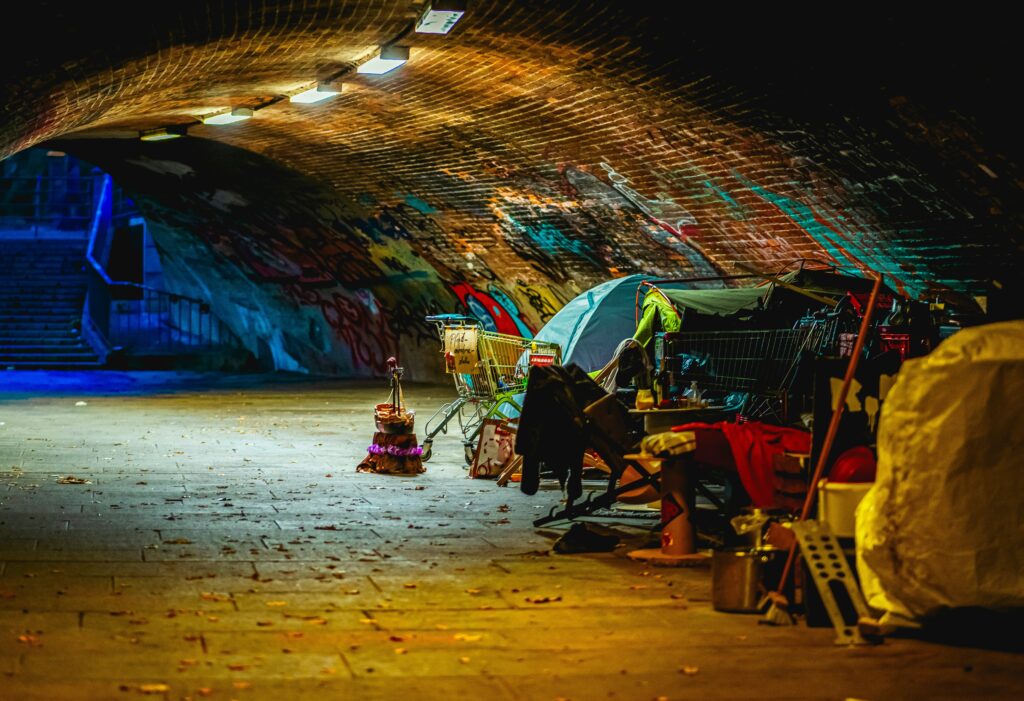by Janita-Marja Juvonen
I see them in my mind’s eye, but also in real life. I can’t simply block them out or overlook them: the many people who have similar experiences today and have to fight for survival, just like I did in the past. These memories make me feel helpless – as helpless as I was back then. This helplessness sometimes makes me sad and often angry. Because on many issues, such as homelessness, I believe that we could change things if we really wanted to.
When I talk about my experiences and feelings with survivor’s guilt, I am often met with a lack of understanding. For many, it seems like the worst is behind me. I even go along with that. But in the minds of those who do not know such experiences, everything is “over”. And that’s where I stop going along with it.
I often hear phrases like, “Just don’t think about it anymore,” “That’s in the past, just forget about it,” or, “Look forwards, not backwards, and be grateful for what you have now.” My personal “favourite” is “Just be grateful and happy.” Sometimes I just can’t hear that anymore.
Such statements are anything but helpful. On the contrary: they reinforce my feeling that I am doing something wrong in the moments when I feel survivor’s guilt. I should just feel differently – skip through life permanently grateful and happy. Then it would disappear. They make me believe that I’m not right, that I don’t feel the right things and that I’m not behaving properly. It is something that characterised my life a lot when I was homeless: being misunderstood.
I am grateful and happy! Except in a professional context, I very rarely look back. I love my life and enjoy it. But that doesn’t change the fact that I suffer from what is known as complex post-traumatic stress disorder (C-PTSD), which is not simply cured by housing and gratitude. And “meditating it away” or other such things just doesn’t work either.
What I experienced, my previous life, cannot be excluded from my new life with my own flat key and a door. Even though meditation and yoga are very supportive in many areas and have found a place in my everyday life, they are not a universal remedy. We want simple solutions for complex problems. But often, they don’t exist. I can deal with what I’ve experienced better through yoga and meditation, but homelessness leaves lasting, deeply ingrained traces.
I have to live with the fact that I have seen many people die on the street. That I lost friends and had to watch some of them die. I have to live with the fact that many people continue to die on the streets and that I am not in a position to really do much about it.
That I alone cannot save these people. I have to live with the fact that I still feel guilty, even though I’m doing well today. I am still actively working on clearing this emotional debt. But I won’t feel any more guilty for feeling the way I do.
Homelessness has severe and often lasting psychological consequences – and it can kill. Having your own living space can prevent this. Being lectured by people who have not experienced this situation does not help. And once a person has the chance to get a flat, it takes time to really come to terms with what they have experienced on the street. Some people don’t manage to allow that confrontation and can’t get out of the cycle, fleeing further towards alcohol in order to forget, not to have to recognise it, not to work through it, because it is so painful and seems to be an insurmountable mountain.
But when people come to terms with their situation and thereby burden themselves with survivor’s guilt, they cope with their story in the way that their body and subconscious can. Unfortunately, people experiencing homelessness are often denied their feelings and needs by people who have never experienced such an extreme situation.
I left my own street time behind me for almost as long ago as the amount of time I spent there. Nevertheless, I was only able to start processing a few years ago. Until then, I needed time and peace to reorganise my health and my life in order to be able to cope in the “living world” at all.
It takes patience to admit to yourself that things can be the way that they are now. The constant ignoring, fighting against it because others give you the feeling of “you’re not normal” takes, at least for me, much more strength than finding and following my path of acceptance. Incidentally, several psychology experts told me at a conference, “You’re reacting quite normally.” Since then, I’ve been thinking to myself, finally, I’m normal for once, and not always the alien!
Let’s treat each other with more understanding and respect. I once read about the library of “living books”. There, people can read other people. A person sits there with a “heading”; for me, it would be homelessness or adoption, for example. Then other people sit down with the “headline” that interests them and read its story from the “Book of Man”. That should exist everywhere.

Translated from German via Translators Without Borders
Courtesy of Trott-war / INSP.ngo

